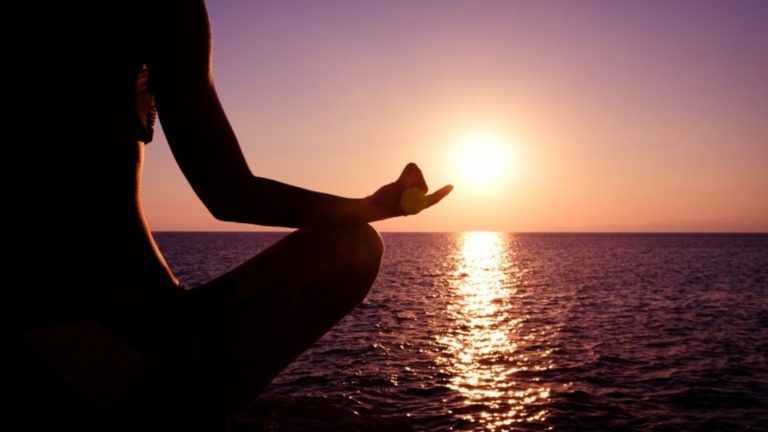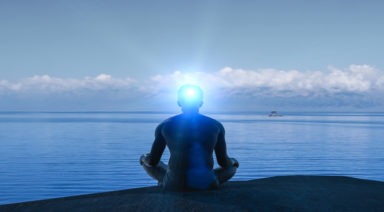Unlocking the Mystery of Meditation

Meditation is a mystery to those who have not experienced it. Part of the trouble is that the language of meditation can seem esoteric; we’re talking about the mind and our experiences in the mind, which can be difficult to articulate. The best way to demystify this enigma is through practice and experience.
It is only through the experiential level that one can truly understand the power and simplicity of meditation. It’s an interconnected phenomenon that can radically change one’s outlook on life. Below are some key milestones of the development of the mind:
- First, one begins to meditate on a daily basis.
- Then, one’s perspective on life completely changes.
- Lastly, one’s life does change based on new attitude, different decision making, less reaction & more action, and positive energy
Everyday situations that initially seem overly complex can begin to unravel one by one, like the layers of an onion. Perhaps we’ve been stuck in the same job, or our partner doesn’t love us how we want them to, or life just isn’t fair—”others are always getting better opportunities than we are”. We blame these things on the fact that we [are just] unlucky and there is nothing to do about it. Meditation can help us reduce our attachment to the way things are so we can better understand why things are. Just simply reality for what it is.
Meditation helps us understand that changing our external circumstances begins with changing our mental attitude. We can attend a zillion yoga classes, read self help books, talk to therapists and complain to others. But until we stop the runaway train of our minds and simply sit with the reality as it truly is, we won’t find the kind of clarity that leads to happiness, contentment and joy.
Meditation doesn’t make our problems disappear; meditation helps us see our problems clearly, and makes mental space for solutions to arise.
That is the beauty of meditation.
- The beauty of taking control of one’s outlook.
- The beauty of understanding our motives.
- Understanding our mistakes.
- The beauty of moving past the clutter in the mind and towards inner peace.
Three easy steps to commit to the practice of meditation:
1. Make a commitment to sit. Join a class. Attend an online course. Read a book about meditation—there are so many to choose from! Take baby steps at first. Once you learn the basics, start small. Five minutes a day will lead to 10 minutes, then 15…
**2. Ask for support from your friends and family. ** Let them know about your commitment to meditate. A sangha of like-minded friends is the best framework for support.
**3. Do not waver! ** Times will get tough and your mind will wander like a monkey leaping from tree to tree in the jungle. You are not alone in this—in fact, this state of mental unrest is known as “monkey mind”! Keep coming back to your practice again and again, and eventually the monkey will get comfortable and take a nap.
By learning the technique and practice of meditation, you will begin to develop wisdom derived from deep within the subtle body. From that, you will begin to know yourself. When we know ourselves, we can begin the slow process of knowing others and developing compassion and equanimity for all sentient beings.
“The physical world, including our bodies, is a response of the observer. We create our bodies as we create the experience of our world.” ~Deepak Chopra
Join the Internal Selfie Revolution

Have you joined the selfie revolution? Since Robert Cornelius took the first selfie in 1839, humans have been fascinated, if not obsessed, with snapping images of themselves. People now take selfies for many reasons, such as telling a story and capturing memories.
Did you know that people have been taking internal selfies since time immemorial, well at least several thousand BCE? It’s called meditation! It’s nothing mysterious or fancy. All you have to do is turn your camera inward and snap a picture of your current state of mind: What do you see?
Some early forms of meditative introspection included ritual dance, reciting mantra, and sitting crossed-legged under a Bodhi tree. Today, the meditation movement has captured the world’s attention. We are learning to turn our minds inward everywhere from the gym, yoga and tai chi class, the office and at our desks, in the classroom, and the boardroom.
Ready to begin your own mindfulness journey? It’s easy. Get your camera and join the Internal Selfie Revolution! Here’s how to start your practice today.
The Psychology of the Selfie
Why do we retake our image multiple times in order to get it just right before hitting send? On a superficial level, a selfie is casual, easy way to communicate a snapshot of yourself in-the-moment. It may be used as verification or to document change. However, a selfie also give us valuable information. From a selfie we can assess our:
- Appearance
- Thoughts
- Emotions
- Feelings
How to Take an Internal Selfie: The Basics
Now try turning your camera inside. Take a peek into your own brain. Let your Internal Selfie develop into an image or sensation – it might have a distinct shape, specific texture, or even a splash of color. Examine your internal snapshot as it manifests: try not to judge, reject, embrace or explain it. Just look at it directly and be curious!
















